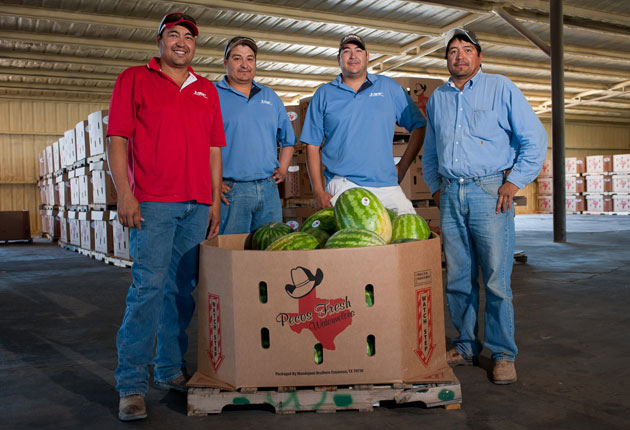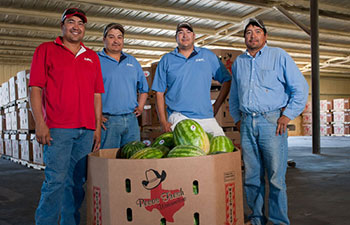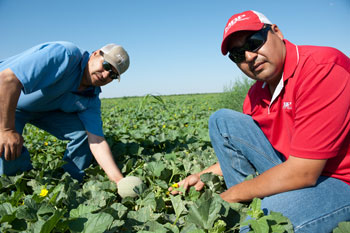
Left to right: Mando, Tony, Beto and Junior Mandujano
Photos by Mark Matson
Emerald green and waist high, the Mandujano family’s fall crop of cotton near Coyanosa, Texas, contrasts with the spiny Texas sotols, creosote bushes and honey mesquites that populate this arid region known as the Trans-Pecos.
Despite the harsh conditions, four Mandujano brothers have established a diversified farming operation here widely known for growing sweet Pecos cantaloupes and juicy watermelons. Building the successful business took time, though.
“Growing up, our parents made us work summers, spring breaks and days off, either transplanting onions on the farm or harvesting onions, peppers and cantaloupes,” recalls Mando Mandujano, 37, one of eight boys and three girls born to Alvaro and Cecilia Mandujano. “They would tell us, ‘This way, you will learn what it’s like to do hard work, so you can go to school and do something better.’
“We did go to school,” Mando continues. “Nine of us graduated from Angelo State University (in nearby San Angelo). Yet four of us ended up back on the farm. That’s ironic, but at least we're in different shoes now!”
Learning to Farm as Kids
The shoes are those of the owners. Mando and three of his brothers — Tony, 41, Junior, 39, and Beto, 35 — run their own business called Mandujano Brothers. They've also purchased many of the fields where they once worked as kids, and own most of the 6,000 acres they now farm in Pecos and Reeves counties. This year, the brothers planted nearly 4,000 acres in cantaloupes, watermelons, onions, peppers, pumpkins, cotton, alfalfa and hay.
But of all places, why Coyanosa, a tiny community located 30 miles southeast of Pecos in Far West Texas?
“Years ago, Dad worked for the Hoelscher family who owned farms west of Midland,” says Mando, who’s seated at his desk in the farm office. Behind another desk, Junior leans back and relaxes in a padded swivel chair, while Mando’s two Chihuahuas, Bella and Morgan, doze on a blue couch set against a paneled wall.
“After the Hoelscher family bought farmland at Coyanosa, Dad moved us here in 1977, so he could run the new operation,” Mando explains. In 1982, their dad later went to manage a different local farm, and for the next seven years, the Mandujanos both lived and worked there.
“As a family, we'd always grow a sizable garden, like maybe two to five acres,” Mando continues. “But during those seven years, Dad had more liberty, so we'd grow 15 to 40 acres of vegetables.”
Alvaro bought the 500-acre farm in 1988 and became an independent producer. “Then we started growing even more vegetables, like 100 or so acres,” Mando says. In the meantime, the four brothers successively graduated from high school and then college.
From Teaching to Farming

In between classes and during time off, the brothers continued to farm. “After Tony graduated in 1993, he taught school and grew 80 acres of watermelons on the farm in the summer,” Mando says. “Junior taught, too, after he graduated in '96. After I graduated in '97, I looked at a few jobs. Then my brothers and I decided to form a partnership, because we already had a lot of equipment and land invested in farming.”
Mando was the first brother to work full time for the new company. Beto came on board after he graduated from Angelo State in 2000, followed by Junior and Tony, who respectively left teaching in 2001 and 2007.
“My teaching job supported our farming habit until I quit,” Junior jokes.
As the business evolved and grew, each partner took on different responsibilities. Today, Tony oversees hired hands and harvests. Junior manages growing and farming duties. Mando takes care of bookkeeping, equipment and sales, while Beto is involved in sales, food safety, construction and logistics.
“We own our own trucks, so we can deliver our produce directly to stores in our area,” Mando says. “The big key to our success is that we are involved in every aspect of our operation. We grow and harvest our vegetables. We bring in our own crews so we can better control quality. We have our own packing facility, and we direct-sell to stores such as Kroger, H.E.B., Safeway and Wal-Mart. It’s a lot of work, but it’s a much better deal for us.”
Overcoming Rain and Labor Shortages
Because only a foot or so of rain falls annually in the region, local farmers must rely on water wells to irrigate crops. On their land, the Mandujano brothers have installed underground drip lines across 4,000 acres.
“It’s a better way of irrigating in the desert,” Mando says. “There’s less loss of moisture to evaporation, and diseases aren't as easily spread. The underground lines also increase yields and produce higher quality produce.”
In 2001, the Mandujanos were among the first in the area to integrate Global Positioning System (GPS) technology with their drip lines and tractor equipment. They also educated other farmers, who were skeptical about the new way of farming. “Back in the day, going from horses and mules to tractors was a huge change for farmers,” Junior says. “GPS was the next big step.”
Besides rain, local help is also scarce, especially in the hot summer months. “So we import a lot of labor,” Mando says. “Under the (U.S. Department of Labor) H-2A program, we bring in workers with guest visas from Mexico. The work is tough, but the pay is fair. We also house and supervise them. When they're done, they go back home.”
“Many of them have worked with us for five or 10 years,” adds Tony, who has slipped into the office and taken a seat at a third desk. On the couch, Bella and Morgan continue to snooze contentedly.
Famous Pecos Cantaloupes
From the start, the Mandujano family grew cantaloupes, but on a smaller scale than Pecos-area producers in adjoining Reeves County, where “Pecos” cantaloupes were famous for their unique aroma and sweet flesh. By the mid 1990s, though, high overhead had forced most farmers out of the cantaloupe business.
Enter the Mandujano brothers. Several years after partnering, they began growing cantaloupes on a commercial basis on their Pecos County farm. Since 2006, they have labeled their cantaloupes and watermelons with a “Pecos Fresh” logo — a Stetson hat set atop a red Texas.

For more than 90 years, cantaloupes from Pecos, Texas, have been popular for their sweet flavor, which comes largely from the area's potassium-rich soil. Beto, left, and Mando Mandujano inspect a field of cantaloupes on their farm.
“Cantaloupes grow best in hot dry climates and in alkaline soils that are high in potassium,” Mando says. “Whenever all that comes together, like it does on our land, that’s what makes a Pecos cantaloupe so sweet.”
Expanding with Farm Credit Help
Earlier this year, the Mandujano brothers bought a 2,500-acre dairy farm, which they financed with Capital Farm Credit in Alpine, Texas. They plan to lease the dairy and grow mostly cotton and hay on the land.
“We needed more room to expand,” Mando says. “We're glad Capital was able to work with us, and we're looking forward to doing more business with them. Their rates are very competitive, and their dividends are attractive, too.”
The loan is the brothers' first with Capital Farm Credit. “We are so excited to have the Mandujanos as customers,” Loan Officer Ashley Wood says. “They are truly one of the best producers in our area. Most impressive is the fact that they've built their company themselves, literally from the ground up.”
Brotherly Love
Beto has just arrived. On cue, the Chihuahuas wake up, jump off the couch and hurry out the door he’s holding open. Beto prefers that they stay outside, which leads to a final question: How do the Mandujano brothers get along?
“It’s not easy!” Mando replies, laughing. “In fact, it’s very challenging, but we work through issues. We're like a husband and wife. We'll argue about the small stuff, but on major decisions, we come to a consensus quickly.
“We all have goals, and they're similar,” he adds. “We're taking different roads to get there, but we're all going the same direction. If for some reason we ever do go our separate ways, I'm sure we'll go in similar ways, because we all have a strong love for the land and farming.”
Pumpkin Patch Attracts 2,000 Visitors
Kids across West Texas look forward every October to the Pumpkin Patch at the Mandujano Brothers farm. By car or bus, they come to pick a pumpkin, listen to stories and scramble through a hay bale maze.
The annual event started on a whim.
“About seven years ago, Mando and I grew so many pumpkins that we couldn't get rid of them,” Beto says. “So I called our area schools and asked if they'd like to bring their students out. A few days later, we couldn't believe it when we saw four buses drive up, then five or six more!”
In time, their annual Pumpkin Patch attracted so many kids that the two brothers couldn't keep up with scheduling busloads. So Beto’s wife, Veronica, who taught school before becoming a stay-at-home mom, took over the popular event. Under her direction, the Pumpkin Patch has since expanded to three “family Saturdays” in October.
This fall, more than 2,000 school children and families from as far away as Presidio, on the Texas-Mexico border, were expected to visit the Mandujanos' 120 acres of pumpkins.